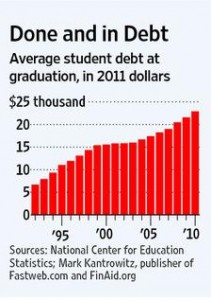 $22,900: Average student debt of newly minted college graduates, according to a WSJ article by Mark Whitehouse. Whitehouse goes on to argue that such debt levels, while representing an all-time high, may not be a problem for some:
$22,900: Average student debt of newly minted college graduates, according to a WSJ article by Mark Whitehouse. Whitehouse goes on to argue that such debt levels, while representing an all-time high, may not be a problem for some:
“As of 2009, the annual pre-tax income of households headed by people with at least a college degree exceeded that of less-educated households by 101%, up from 91% in 2006. As of April, the unemployment rate among college graduates stood at 4.5%, compared to 9.7% for those with only a high-school diploma and 14.6% for those who never finished high school.”
In other words, the economic advantages of a college degree have been increasing. Undeniably true. The flip side, however, is that unsuccessful college students end up with the worst of both worlds: An ocean of debt, and either no diploma or a job that didn’t require a diploma. Richard Vedder, author of Going Broke by Degree: Why College Costs Too Much, has argued that nearly 50% of full-time students have not graduated after six years of college. That gets pricey, even if they do eventually graduate.
Secondly, the number of jobs which truly require a college degree are growing less rapidly than the number of new college graduates. Vedder claims that almost one-third of a million waiters and waitresses have college degrees as do more than 15% of taxi drivers. If that’s true, those who barely graduate high school might be better off pursuing vocational training and getting into a career track that might initially pay less, but in which they can be more successful and for which they will not have accumulated crushing debt.
As I write in Thriving at College (p. 201): “Our culture says that some careers are more prestigious than others, but as Christians, we should not accept the world’s perspective on degrees, money, and status. To God all legitimate vocations have equal dignity.”